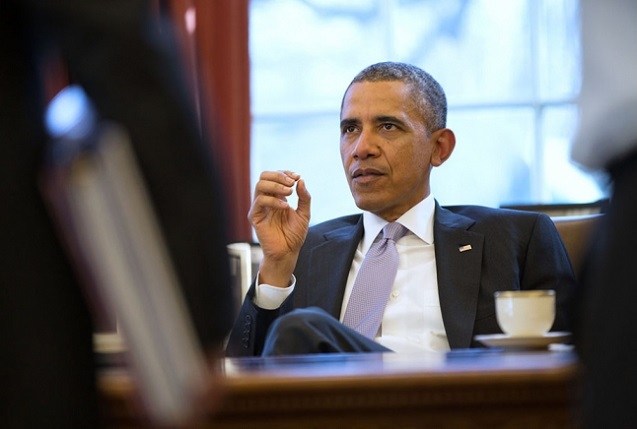
Support justice-driven, accurate and transparent news — make a quick donation to Truthout today!
With at least one house of Congress almost certain to be under the control of intransigent Republicans through the rest of his presidency, there is little prospect for any major legislative action over the next three years. However President Obama has said that he intends to use his presidential power to do what he can to improve the economy and lay the groundwork for future change.
While there are limits as to what Obama can based on executive authority alone, there are many areas where he can have an impact. He already identified on area in his State of the Union Address when he announced that new federal contracts would require that workers be paid a higher minimum wage. This sort of action can be carried much further.
For example, he could announce that the federal government will no longer use credit checks in considering people for employment, as has been urged by Demos for some time. Senator Elizabeth Warren has proposed legislation to ban credit checks by employers (keeping people from getting jobs because they don’t have money seems a rather perverse policy), but with this bill unlikely to pass Congress any time soon, there is no reason that President Obama can’t hold the federal government to this standard.
In a similar vein, President Obama can grant the employees of U.S. embassies the right to unionize. U.S. embassies are of course U.S. territory, which should mean that the same rules that apply to federal employees in the United States apply to federal employees in embassies abroad. Unfortunately that has not been the case, with the government refusing to bargain with workers in its embassies.
There is no justification for refusing to recognize these workers’ rights. The federal government has a long history of working with unionized workers with few problems. Workers have organized unions in most sectors of the government, even in the FBI. It’s hard to see why the federal government can’t recognize unions in its embassies.
Besides, the right of workers to organize is supposed to be one of the principles that we promote in our diplomacy. That would seem harder to do when we deny this right to the workers in our own embassies. This should be an easy for President Obama, just let the embassy workers organize if they want.
Since those two steps are easy, let’s try something that is a bit harder. The United States is not going to get back to full employment until it gets its trade deficit down considerably from where it is now. The country is currently running a trade deficit of $500 billion a year, or roughly 3 percent of GDP. This is demand that is going overseas rather than generating employment in the United States.
To maintain full employment this demand must be made up from some other source. There are not a lot of plausible candidates in this area. The federal government could make up this lost demand by running large deficits, but the Republicans have been screaming about deficits and even the Democrats are more interested in reducing deficits that promoting growth and jobs. In the 1990s and the last decade we offset the lost demand with the stock bubble and the housing bubble, but inflating another bubble doesn’t seem a good plan.
This means that we have to get the trade deficit down. While Obama has said that he wants to push the Trans-Pacific Partnership and other trade deals for this purpose, everyone knows that’s just silliness for children and reporters at major national news outlets. Trade deals have not and will not reduce the size of the trade deficit.
The key to getting the trade deficit down is to get the value of the dollar down. And this is something that can be negotiated by the president without the involvement of Congress. This is simple a question of sitting down with China and other major trading partners and working out a deal for a lower dollar.
There is precedence for this sort of process. The Plaza Accord under President Reagan led to an orderly decline in the value of the dollar and a sharp reduction in the trade deficit.
Of course negotiations mean that we are prepared to give up something. This shouldn’t be too hard. We can tell China and other trading partners that we won’t press them on opening up their financial markets to J.P. Morgan and Goldman Sachs. We can also tell them we don’t care if they don’t pay Microsoft for copies of its software. That seems like a small price to pay for the millions of jobs that could be created by reducing the trade deficit.
There is a longer list of items that can be put on President Obama’s agenda if he wants to improve the economy through executive action. But these three should be a good start.
Press freedom is under attack
As Trump cracks down on political speech, independent media is increasingly necessary.
Truthout produces reporting you won’t see in the mainstream: journalism from the frontlines of global conflict, interviews with grassroots movement leaders, high-quality legal analysis and more.
Our work is possible thanks to reader support. Help Truthout catalyze change and social justice — make a tax-deductible monthly or one-time donation today.